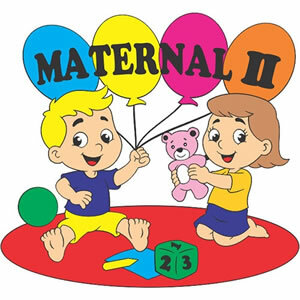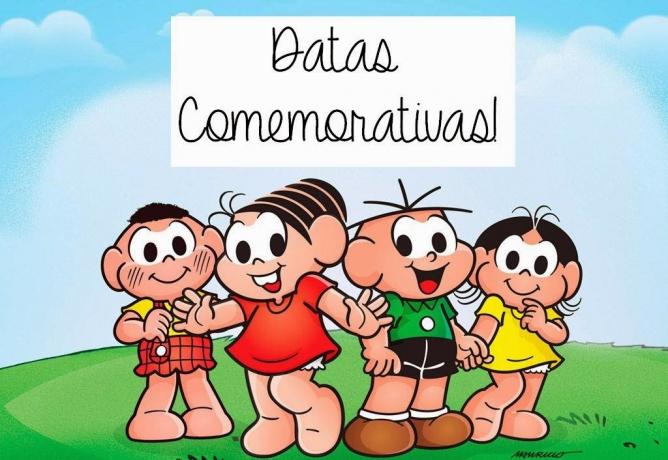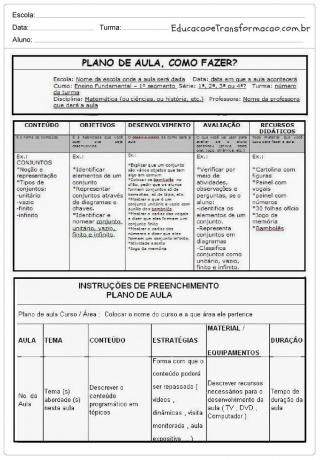
O planning is present in almost all of our actions, as it guides the performance of activities, planning is essential in different sectors of social life, becoming essential also in the teaching activity, with class plan, and thinking about it we selected for you in this post Annual Planning for Maternal, ready to print.
I also recommend:
Index
Also check:
To access the complete "Annual Plan for Maternal 3", prepared by Colégio Imaculada Conceição, check the following link and download it in PDF:
Create several playful teaching strategies that enable the child to build a positive self-image, learning to respect differences, facilitating oral and written language learning.
Use of pencils, brushes, glue, scrap material, chips, badges, posters, concrete and educational materials, games and games, puppets, CDs, stereo, crayons, crayons, storybooks, magazines, comic books, etc.
The assessment will be continuous, through daily observation of the child in the performance of their activities, in the relationship with peers and with the teacher.
Expand the child's expressive possibilities through gestures, body rhythms through games, dances, games and other interaction situations.
CDs, stereo, rope, bowling, ball, colored chalk, tire, hula hoop, etc.
Assessment will be continuous, through daily observation of the child in the performance of their activities, in the relationship with peers and with the teacher.
Provide opportunities for children to develop the ability to establish approximations to some mathematical notions present in their daily lives, such as counting, spatial relationships, etc.
Colored pencils, jigsaw puzzles, numeral chips, educational fitting games, toothpicks, scraps, bond, etc.
Assessment will be continuous, through daily observation of the child in the performance of their activities, in the relationship with peers and with the teacher.

Provide adequate conditions to promote the child's well-being, their physical, emotional, intellectual, moral and social development, the expansion of their experiences and stimulate the child's interest in the process of knowledge of the human being, nature and society.
Crayons, glue, EVA, brown paper, educational games, scraps, CDs, stereo, toys, books, magazines, comic books, puzzles, etc.
Assessment will be continuous, through daily observation of the child in the performance of their activities, in the relationship with peers and with the teacher.
Provide opportunities for the construction of the child's identity and autonomy from socio-historical-cultural relationships, in an authentic, conscious and contextualized way.
Crayons, puppets, glue, EVA, brown paper, educational games, scraps, CDs, stereo, toys, books, magazines, comic books, puzzles, etc.
Assessment will be continuous, through daily observation of the child in the performance of their activities, in the relationship with peers and with the teacher.
Assessment will be continuous, through daily observation of the child, in the performance of their activities, in the development of attention, interest, assimilation and learning. The evaluation instrument will be an evaluation form, which we will deliver to parents during the Meetings.
FEATURES: Approximately 2-3 years
Assessment will be continuous, through daily observation of the child, in the performance of their activities, in the development of attention, interest, assimilation and learning. The evaluation instrument will be an evaluation form, which we will deliver to parents during the Meetings.
“This work must be very concrete, based on material handling. This allows children to become more easily familiarized with mathematical concepts.”
Assessment will be continuous, through daily observation of the child in the performance of their activities, in the relationship with peers and with the teacher. The assessment instrument is an observation form that will be given to parents every two months.
Assessment will be continuous, through daily observation of the child in the performance of their activities, in the relationship with peers and with the teacher. The assessment instrument is an observation form that will be given to parents every two months.
Assessment will be continuous, through daily observation of the child in the performance of their activities, in the relationship with peers and with the teacher. The assessment instrument is an observation form that will be given to parents every two months.

March 21 – Beginning of Autumn
Folklore Week

Subscribe to our email list and receive interesting information and updates in your email inbox
Thanks for signing up.


